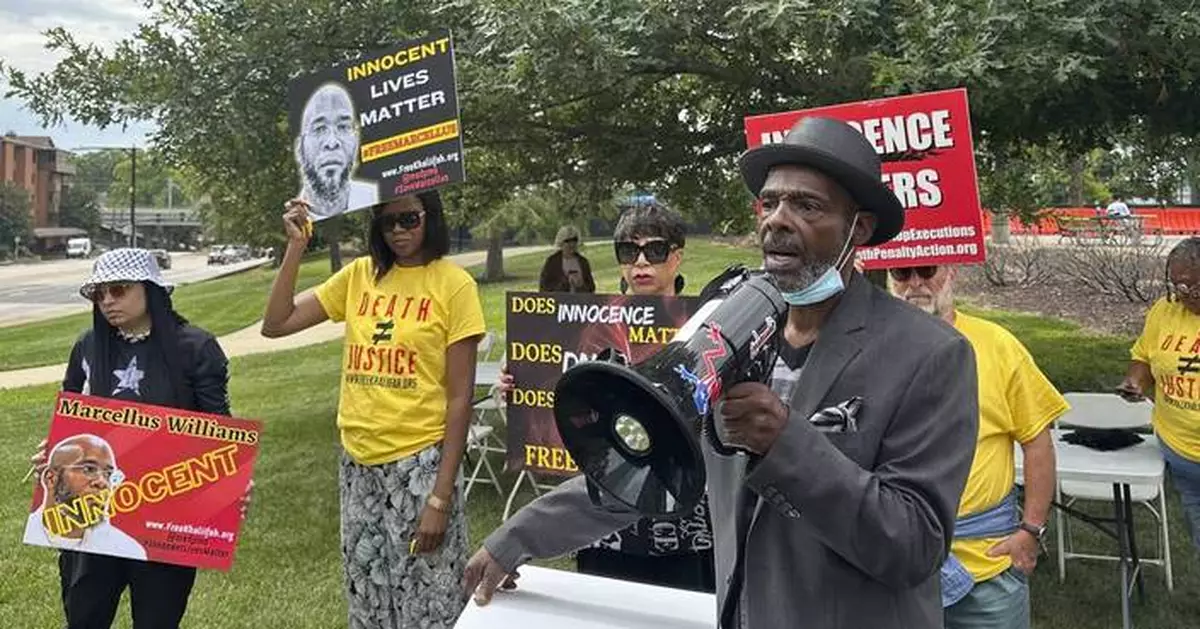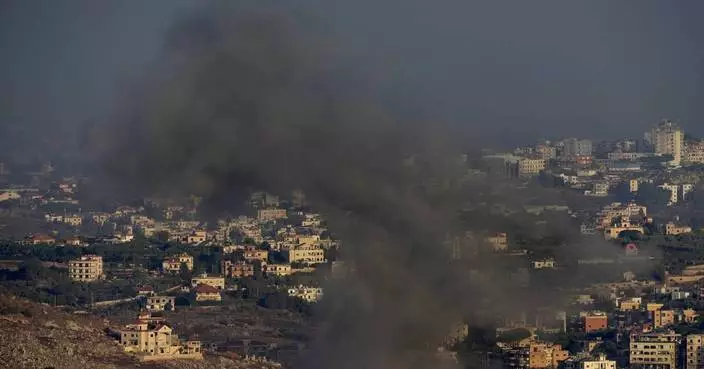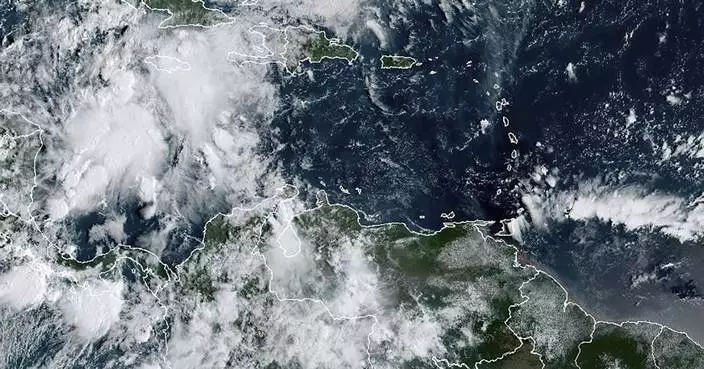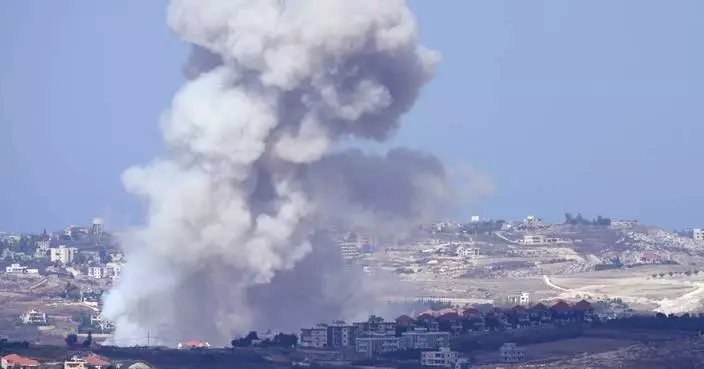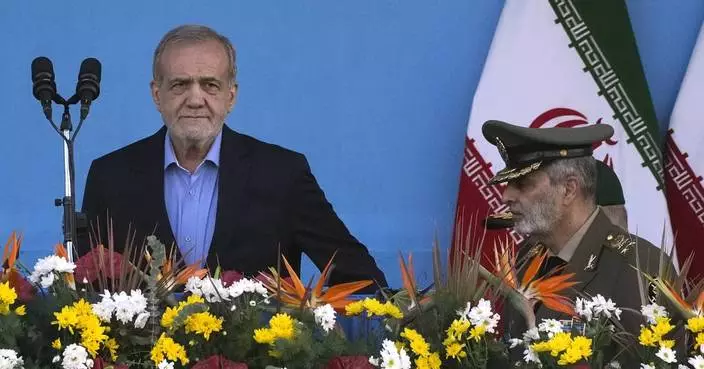JEFFERSON CITY, Mo. (AP) — An attorney for a Missouri man facing execution argued Monday that the state Supreme Court should halt the lethal injection because a trial attorney prevented a Black man who he thought looked similar to the defendant from serving on the jury.
The arguments on behalf of Marcellus Williams came one day before he is scheduled to be executed for the 1998 stabbing death of Lisha Gayle in the St. Louis suburb of University City.
Williams, 55, has asserted his innocence. But his attorney did not pursue that claim Monday before the state's highest court, instead focusing on alleged procedural errors in jury selection and the prosecution's alleged mishandling of the murder weapon.
The state Supreme Court should “correct an injustice” either by declaring that a prosecutor wrongly excluded a potential juror for racial reasons or by sending the case back to a lower court to determine that issue, attorney Jonathan Potts argued on behalf of Williams. Either action could effectively cancel Tuesday's scheduled execution.
Republican Missouri Attorney General Andrew Bailey's office has argued for the execution to proceed. The trial prosecutor has denied that he had racial motivations in removing potential jurors and did nothing improper — based on procedures at the time — by touching the murder weapon without gloves after it already had been tested by a crime lab, Assistant Attorney General Michael Spillane said in arguments to the state Supreme Court.
Attorneys for Williams also have an appeal before the U.S. Supreme Court. Meanwhile, a clemency request before Republican Gov. Mike Parson focuses largely on how Gayle’s relatives want the sentence commuted to life in prison without parole. The NAACP also is urging Parson, a Republican, to stop the execution of Williams.
The execution would be the third in Missouri this year and the 15th nationwide.
Williams was hours away from being executed in August 2017 when then-Gov. Eric Greitens, a Republican, granted a stay after reviewing DNA evidence that found no trace of Williams’ DNA on the knife used in the killing. Greitens appointed a panel of retired judges to examine the case, but that panel never reached a conclusion.
Questions about DNA evidence also led Democratic St. Louis County Prosecuting Attorney Wesley Bell to request a hearing challenging Williams’ guilt. But days before the Aug. 21 hearing, new testing showed that the DNA evidence was spoiled because members of the prosecutor’s office touched the knife without gloves before the original trial.
With the DNA evidence unavailable, Midwest Innocence Project attorneys reached a compromise with the prosecutor’s office: Williams would enter a new, no-contest plea to first-degree murder in exchange for a new sentence of life in prison without parole.
Judge Bruce Hilton signed off on the agreement, as did Gayle’s family. But at Bailey’s urging, the Missouri Supreme Court blocked the agreement and ordered Hilton to proceed with an evidentiary hearing, which took place Aug. 28.
Hilton ruled on Sept. 12 that the first-degree murder conviction and death sentence would stand, noting that his arguments all had been previously rejected.
"There is no basis for a court to find that Williams is innocent, and no court has made such a finding,” Hilton wrote.
On Tuesday, Williams' attorney argued that circumstances are different, because the trial prosecutor had not previously been questioned in court by Williams' attorney about the reason he removed a specific juror.
The prosecutor in the 2001 first-degree murder case, Keith Larner, testified at the August hearing that the trial jury was fair, even though it included just one Black member on the panel. Larner said he struck one potential Black juror partly because he looked too much like Williams. He didn’t explain why he felt that mattered.
The clemency petition from the Midwest Innocence Project focuses heavily on how Gayle’s relatives want the sentence commuted to life without parole. Parson, a former sheriff, has been in office for 11 executions, and has never granted clemency.
Prosecutors at Williams’ original trial said he broke into Gayle’s home on Aug. 11, 1998, heard water running in the shower, and found a large butcher knife. When Gayle came downstairs, she was stabbed 43 times. Her purse and her husband’s laptop computer were stolen.
Authorities said Williams stole a jacket to conceal blood on his shirt. Williams’ girlfriend asked him why he would wear a jacket on a hot day. The girlfriend said she later saw the purse and laptop in his car and that Williams sold the computer a day or two later.
Prosecutors also cited testimony from Henry Cole, who shared a cell with Williams in 1999 while Williams was jailed on unrelated charges. Cole told prosecutors Williams confessed to the killing and offered details about it.
Williams’ attorneys responded that the girlfriend and Cole were both convicted of felonies and wanted a $10,000 reward.
Salter reported from O'Fallon, Missouri.
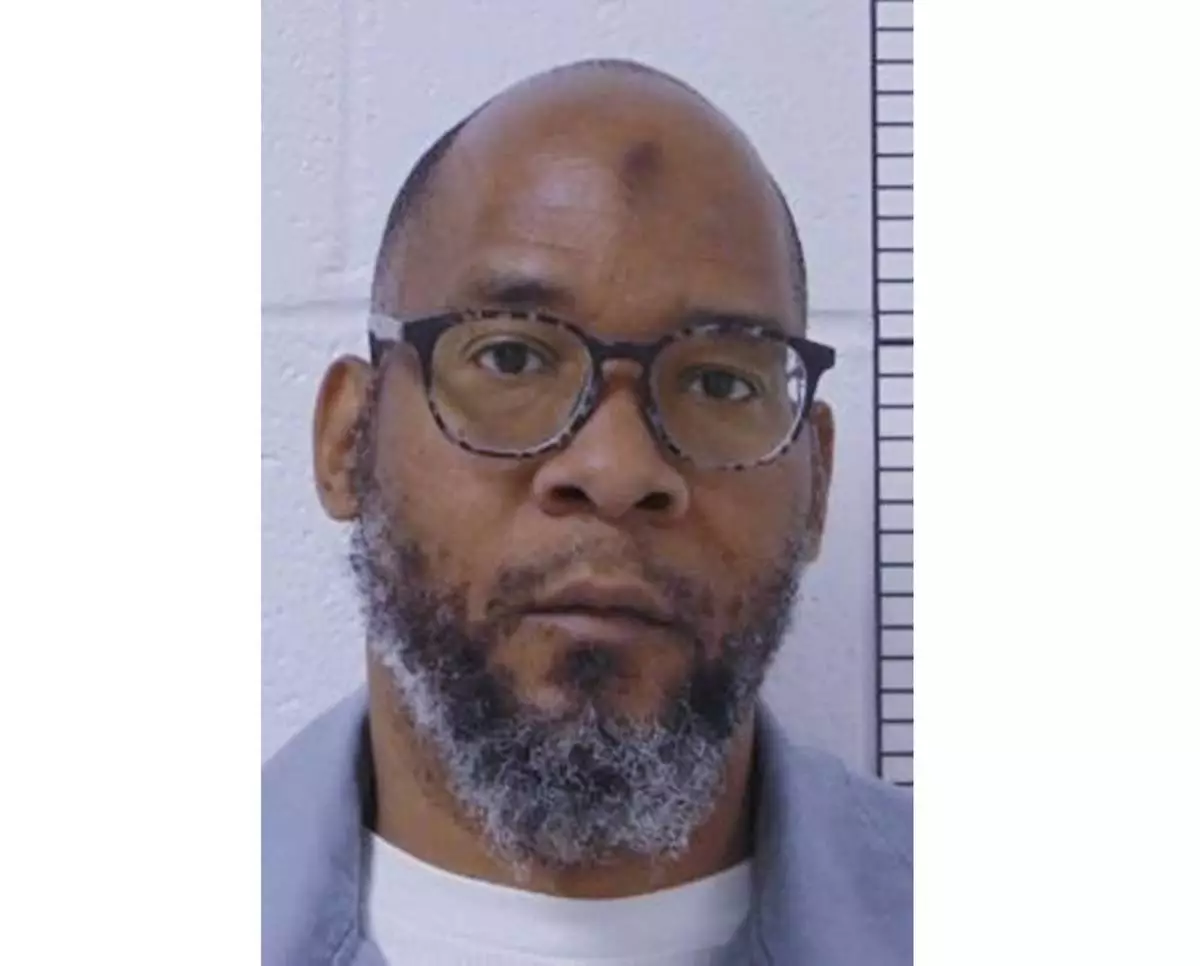
FILE - This photo provided by the Missouri Department of Corrections shows Marcellus Williams. (Missouri Department of Corrections via AP, file)
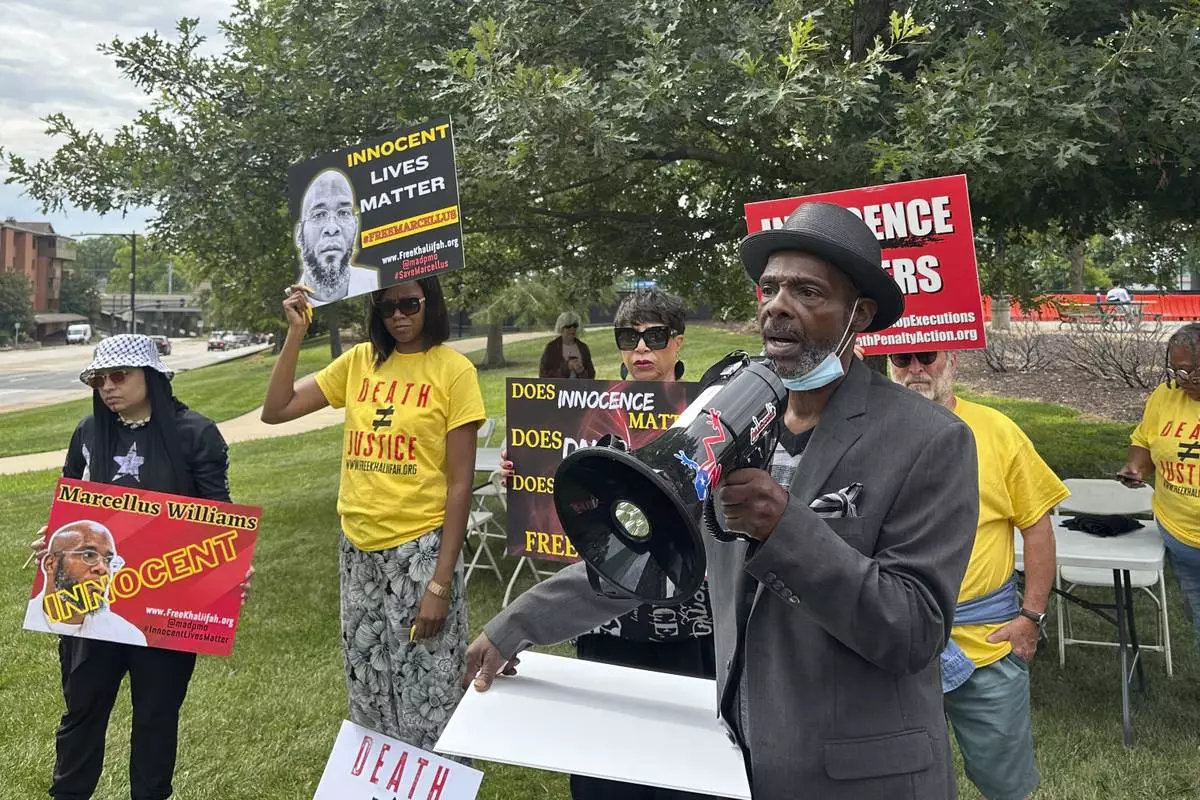
FILE - Joseph Amrine, who was exonerated two decades ago after spending years on death row, speaks at a rally to support Missouri death row inmates Marcellus Williams on Aug. 21, 2024, in Clayton, Mo. (AP Photo/Jim Salter, file)
MARJAYOUN, Lebanon (AP) — Israeli strikes on Monday killed more than 270 Lebanese in the deadliest barrage since the 2006 Israel-Hezbollah war as the Israeli military warned residents in southern and eastern Lebanon to evacuate their homes ahead of a widening air campaign against Hezbollah.
Thousands of Lebanese fled the south, and the main highway out of the southern port city of Sidon was jammed with cars heading toward Beirut in the biggest exodus since the 2006 fighting. More than 1,000 other people were wounded in the strikes — a staggering one-day toll for a country still reeling from a deadly attack on communication devices last week.
The death toll surpassed that of Beirut's devastating port explosion in 2020, when hundreds of tons of ammonium nitrate stored in a warehouse detonated, killing at least 218 people and wounding more than 6,000.
In a recorded message to Lebanese civilians, Israeli Prime Minister Benjamin Netanyahu urged them to heed Israeli calls to evacuate, saying “take this warning seriously.”
“Please get out of harm’s way now,” Netanyahu said. “Once our operation is finished, you can come back safely to your homes.”
The Israeli military said Monday evening that it had carried out a targeted strike in Beirut. It did not give details.
Lebanese Health Minister Firass Abiad told a news conference in Beirut that the strikes hit hospitals, medical centers and ambulances. The government ordered schools and universities to close across most of the country and began preparing shelters for people displaced from the south.
The Israeli military announced that it hit some 800 targets, saying it was going after Hezbollah weapons sites. Some strikes hit in residential areas of towns in the south and the eastern Bekaa Valley. One strike hit a wooded area as far away as Byblos in central Lebanon, more than 80 miles from the border north of Beirut.
The military said it was expanding the airstrikes to include areas of the valley along Lebanon’s eastern border with Syria. Hezbollah has long had an established presence in the valley, and it is where the group was founded in 1982 with the help of Iran’s Revolutionary Guards.
Israeli military spokesman Rear Adm. Daniel Hagari repeated warnings urging residents to immediately evacuate areas where Hezbollah is storing weapons, including in the valley. The warnings left open the possibility that some residents could live in or near targeted structures without knowing that they are risk.
Meanwhile, Hezbollah said in a statement that it fired dozens of rockets toward Israel, including at military bases. It also targeted for a second day the facilities of the Rafael defense firm, headquartered in Haifa.
As Israel carried out the attacks, Israeli authorities reported a series of air-raid sirens in northern Israel warning of incoming rocket fire from Lebanon.
The evacuation warnings were the first of their kind in nearly a year of steadily escalating conflict and came after a particularly heavy exchange of fire on Sunday. Hezbollah launched around 150 rockets, missiles and drones into northern Israel in retaliation for strikes that killed a top commander and dozens of fighters.
The increasing strikes and counterstrikes have raised fears of an all-out war, even as Israel is still battling Hamas in Gaza and trying to return scores of hostages taken in Hamas' Oct. 7 attack. Hezbollah has vowed to continue its strikes in solidarity with the Palestinians and Hamas, a fellow Iran-backed militant group. Israel says it is committed to returning calm to its northern border.
Associated Press journalists in southern Lebanon reported heavy airstrikes targeting many areas Monday morning, including some far from the border.
Lebanon's state-run National News Agency said the strikes hit a forested area in the central province of Byblos, about 130 kilometers (81 miles) north of the Israeli-Lebanese border, for the first time since the exchanges began in October.
Israel also bombed targets in the northeastern Baalbek and Hermel regions, where a shepherd was killed and two family members were wounded, according to the news agency. It said a total of 30 people were wounded in strikes.
The Lebanese Health Ministry put the death toll at 274. It asked hospitals in southern Lebanon and the eastern Bekaa Valley to postpone surgeries that could be done later. The ministry said in a statement that its request aimed to keep hospitals ready to deal with people wounded by “Israel’s expanding aggression on Lebanon.”
An Israeli military official said Israel is focused on aerial operations and has no immediate plans for a ground operation. The official, speaking on condition of anonymity in keeping with regulations, said the strikes are aimed at curbing Hezbollah's ability to launch more strikes into Israel.
Lebanese media reported that residents received text messages urging them to move away from any building where Hezbollah stores arms until further notice.
“If you are in a building housing weapons for Hezbollah, move away from the village until further notice,” the Arabic message reads, according to Lebanese media.
Lebanon's information minister, Ziad Makary, said in a statement that his office in Beirut had received a recorded message telling people to leave the building.
“This comes in the framework of the psychological war implemented by the enemy,” Makary said, and urged people “not to give the matter more attention than it deserves.”
It was not immediately clear how many people would be affected by the Israeli orders. Communities on both sides of the border have largely emptied out because of the near-daily exchanges of fire.
Israel has accused Hezbollah of transforming entire communities in the south into militant bases, with hidden rocket launchers and other infrastructure. That could lead the Israeli military to wage an especially heavy bombing campaign, even if no ground forces move in.
The military said it had targeted more than 150 militant sites early Monday. Residents of different villages in southern Lebanon posted photos on social media of airstrikes and large plumes of smoke. The state-run National News Agency also reported airstrikes on different areas.
An Israeli airstrike on a Beirut suburb on Friday killed a top Hezbollah military commander and more than a dozen fighters, as well as dozens of civilians, including women and children.
Last week, thousands of communications devices, used mainly by Hezbollah members, exploded in different parts of Lebanon, killing 39 people and wounding nearly 3,000. Lebanon blamed Israel for the attacks, but Israel did not confirm or deny any responsibility.
Hezbollah began firing into Israel a day after the Oct. 7 attack in what it said was an attempt to pin down Israeli forces to help Palestinian fighters in Gaza. Israel has retaliated with airstrikes, and the conflict has steadily intensified over the past year.
The fighting has killed hundreds of people in Lebanon, dozens in Israel and displaced tens of thousands on both sides of the border.
Israel has vowed to push Hezbollah back from the border so its citizens can return to their homes, saying it prefers to do so diplomatically but is willing to use force. Hezbollah has said it will keep up its attacks until there is a cease-fire in Gaza, but that appears increasingly elusive as the war nears its anniversary.
Hamas-led militants stormed into southern Israel on Oct. 7, killing some 1,200 people, mostly civilians, and abducting around 250. Some 100 captives are still held in Gaza, a third of whom are believed to be dead, after most of the rest were released during a weeklong cease-fire in November.
Israel's offensive has killed over 41,000 Palestinians, according to the Gaza Health Ministry, which does not differentiate between civilians and fighters in its count. It says women and children make up a little over half of those killed. Israel says it has killed over 17,000 militants, without providing evidence.
Lidman reported from Jerusalem, and Mroue reported from Beirut. Associated Press writer Abby Sewell in Beirut contributed to this report.
Follow AP’s war coverage at https://apnews.com/hub/israel-hamas-war
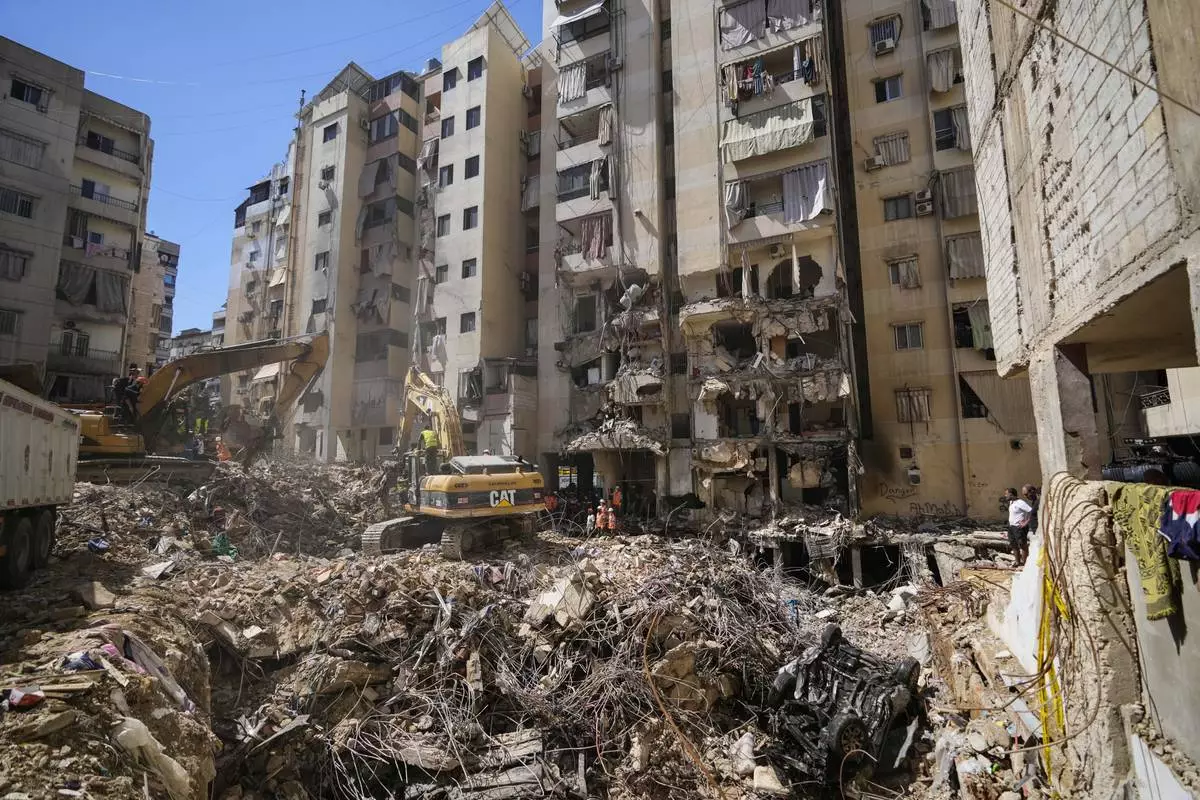
Emergency workers use excavators to clear the rubble at the site of Friday's Israeli strike in Beirut's southern suburbs, Lebanon, Monday, Sept. 23, 2024. (AP Photo/Hassan Ammar)
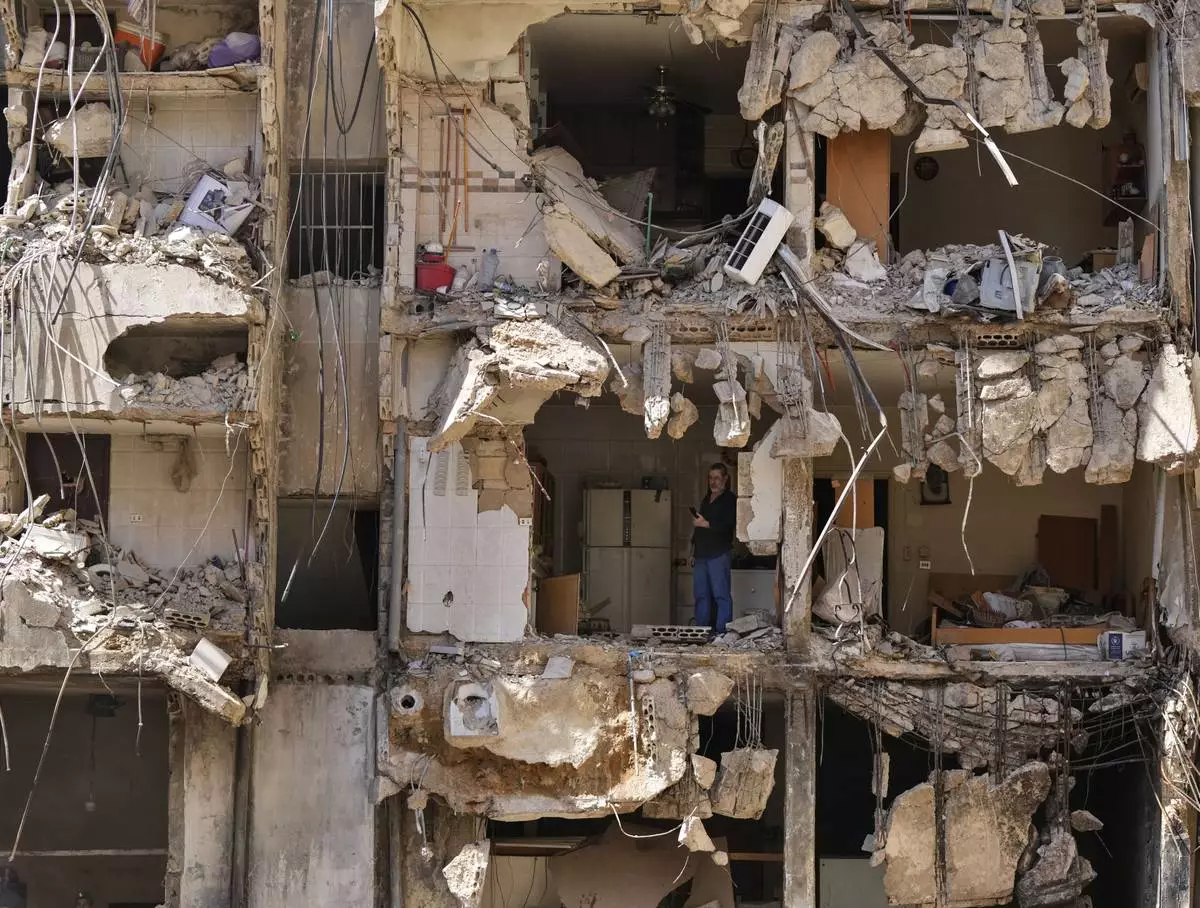
A man watches rescuers sift through the rubble as they search for people still missing at the site of Friday's Israeli strike in Beirut's southern suburbs, Monday, Sept. 23, 2024. (AP Photo/Hassan Ammar)
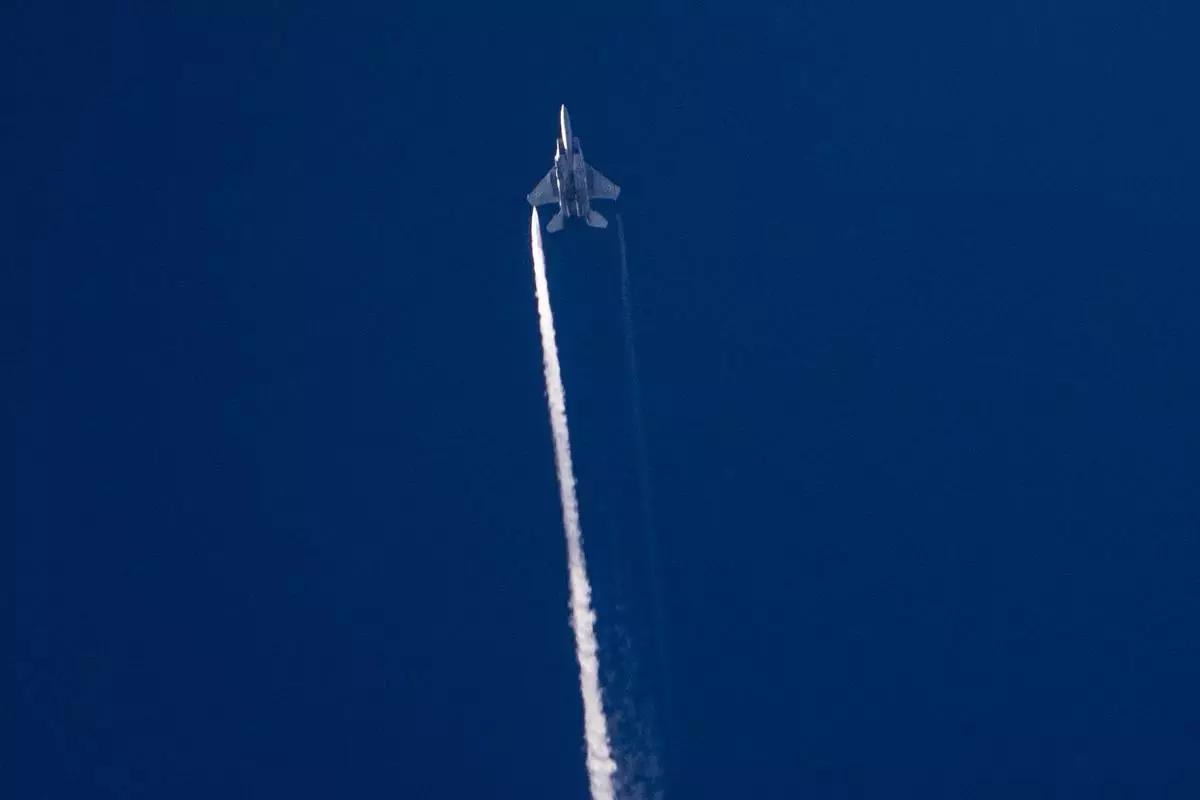
An armed Israeli fighter jet is seen from Hadera as it crosses towards northern Israel, on Monday, Sept. 23, 2024. (AP Photo/Ariel Schalit)
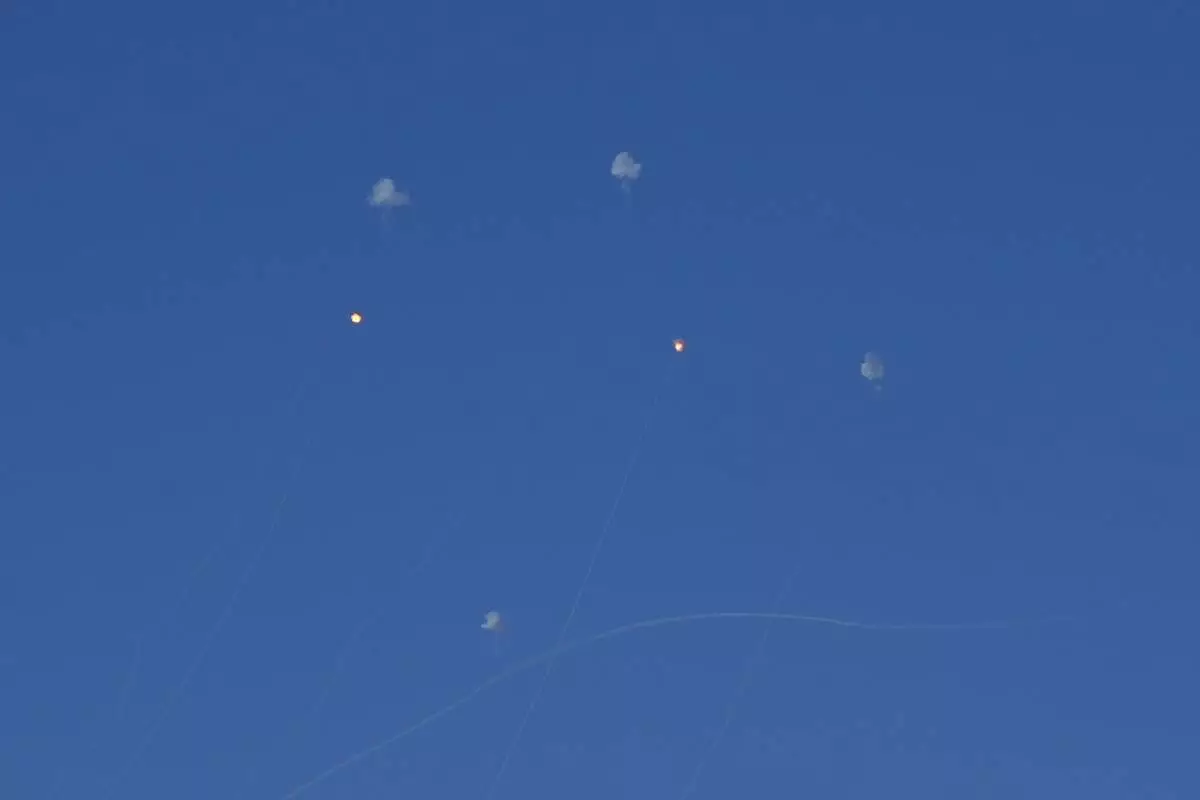
Israeli Iron Dome air defense system fires to intercept rockets that were launched from Lebanon, in northern Israel, Monday, Sept. 23, 2024. (AP Photo/Baz Ratner)
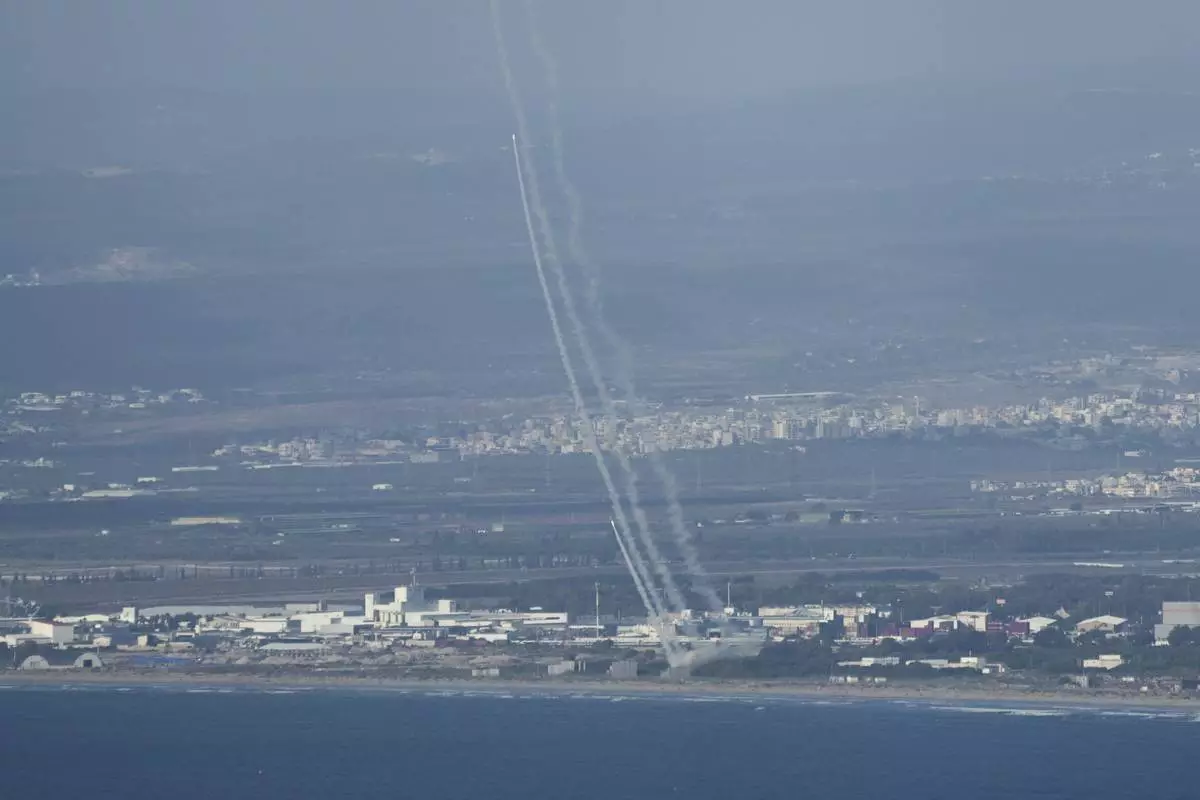
Israeli Iron Dome air defense system fires to intercept rockets that were launched from Lebanon, in northern Israel, Monday, Sept. 23, 2024. (AP Photo/Ohad Zwigenberg)
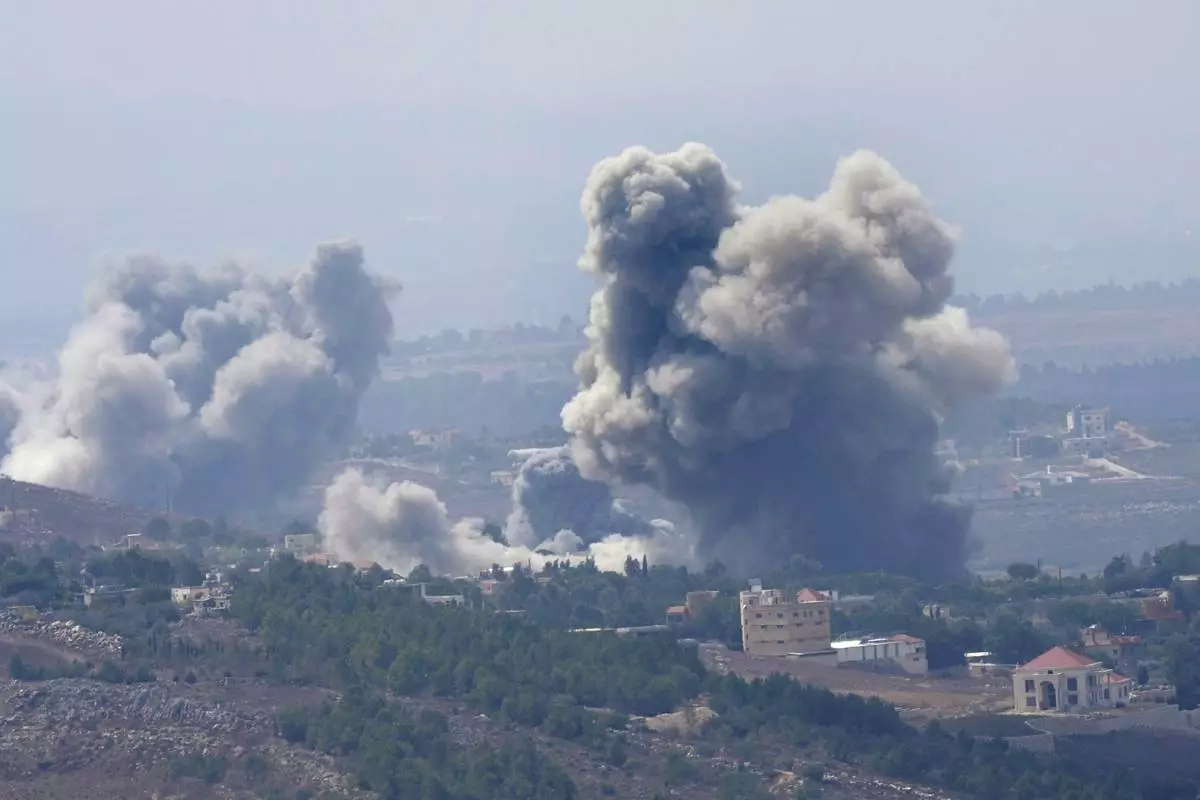
Smoke rises from Israeli airstrikes on villages in the Nabatiyeh district, seen from the southern town of Marjayoun, Lebanon, Monday, Sept. 23, 2024. (AP Photo/Hussein Malla)
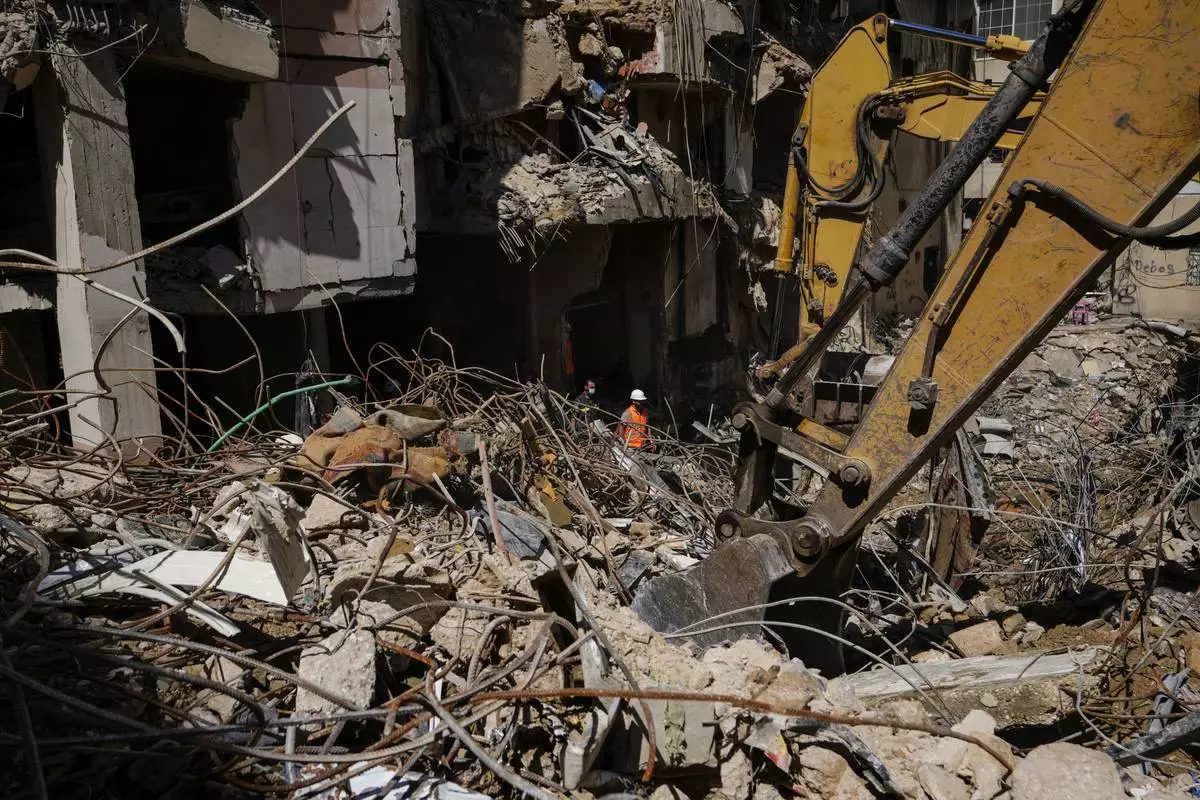
Rescuers sift through the rubble as they search for people still missing at the site of Friday's Israeli strike in Beirut's southern suburbs, Monday, Sept. 23, 2024. (AP Photo/Hassan Ammar)
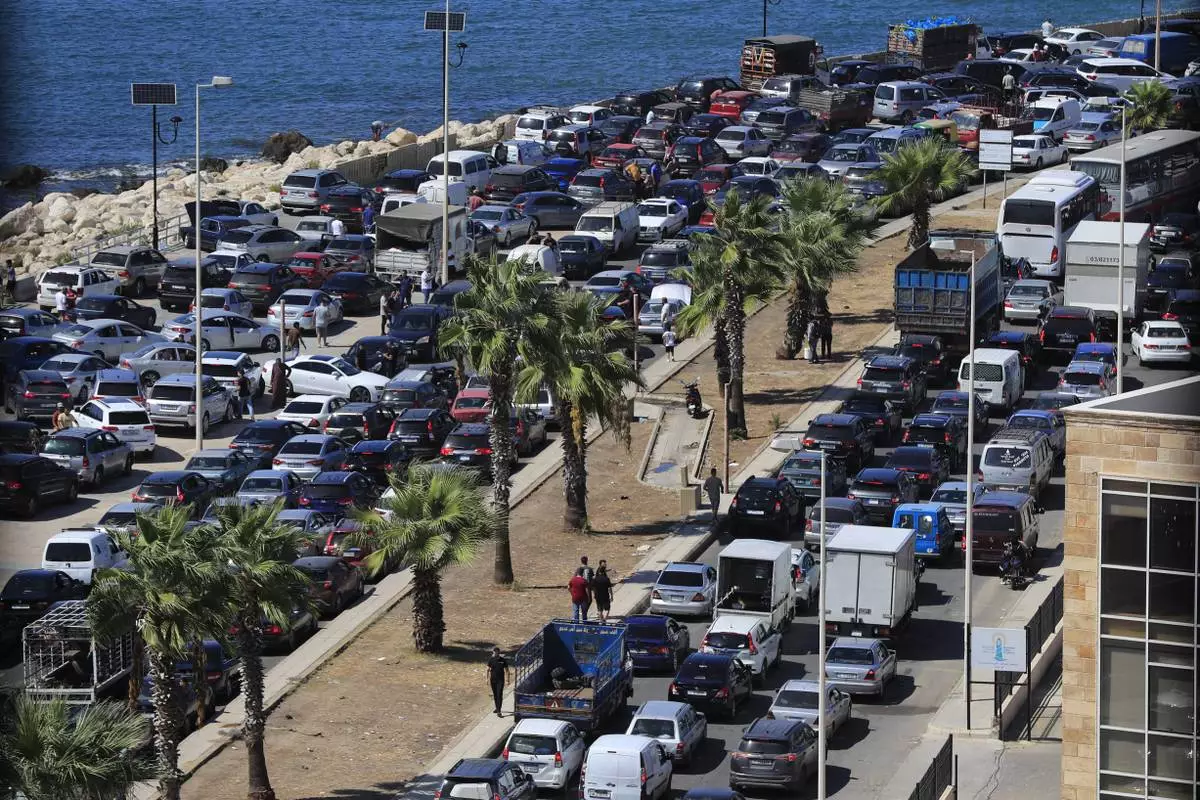
Cars sit in traffic as people flee the southern villages amid ongoing Israeli airstrikes, in Sidon, Lebanon, Monday, Sept. 23, 2024. (AP Photo/Mohammed Zaatari)
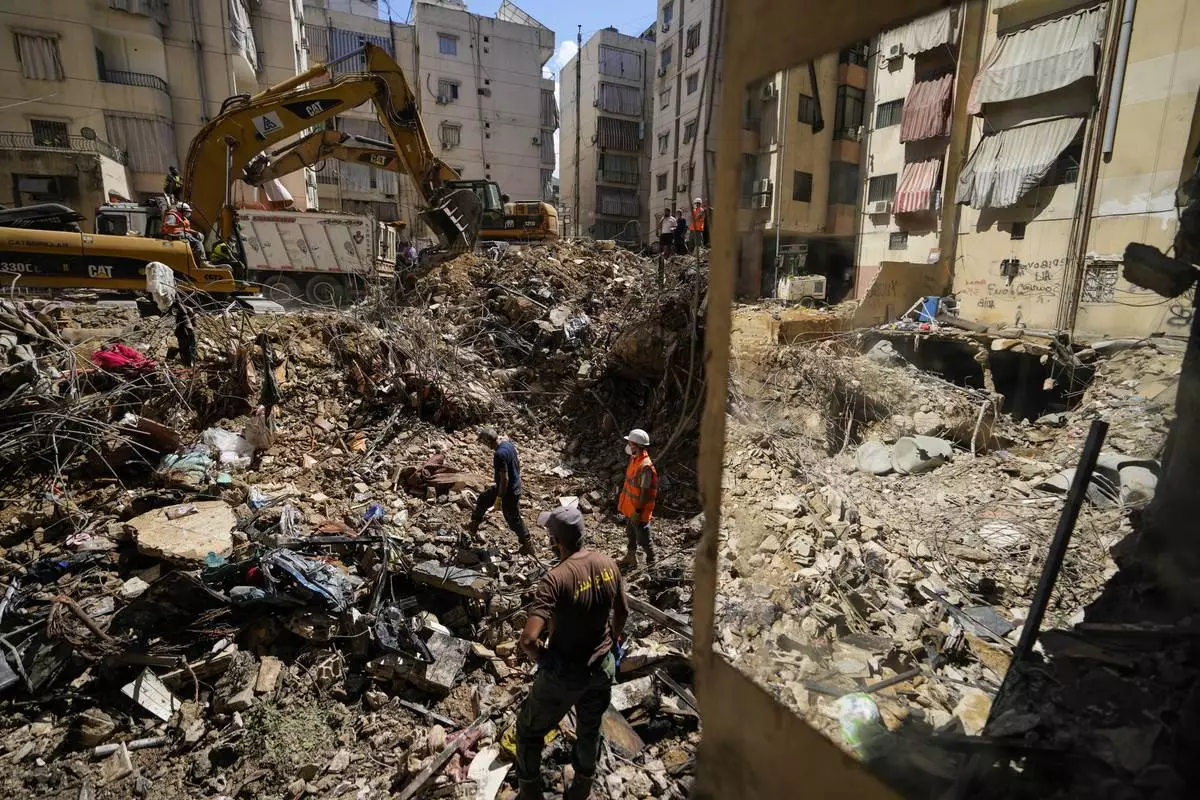
Emergency workers use excavators to clear the rubble at the site of Friday's Israeli strike in Beirut's southern suburbs, Lebanon, Monday, Sept. 23, 2024. (AP Photo/Hassan Ammar)
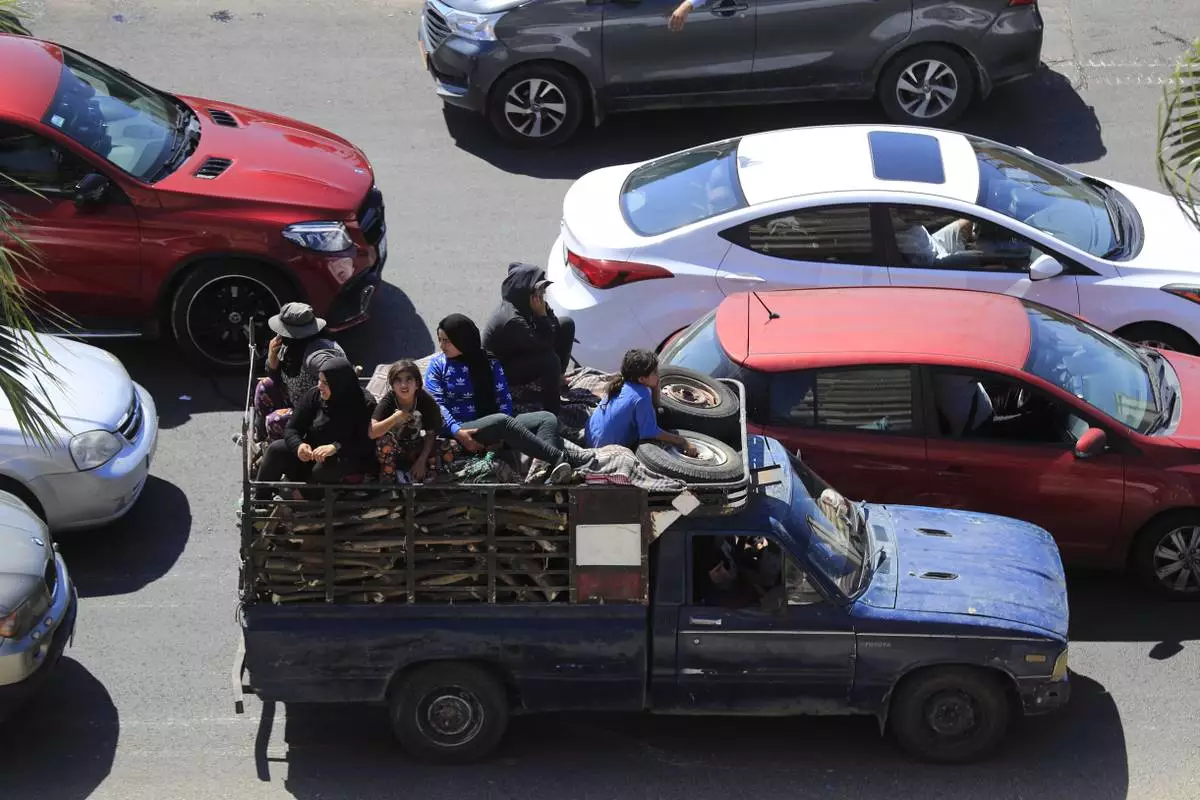
Cars sit in traffic as people flee the southern villages amid ongoing Israeli airstrikes, in Sidon, Lebanon, Monday, Sept. 23, 2024. (AP Photo/Mohammed Zaatari)
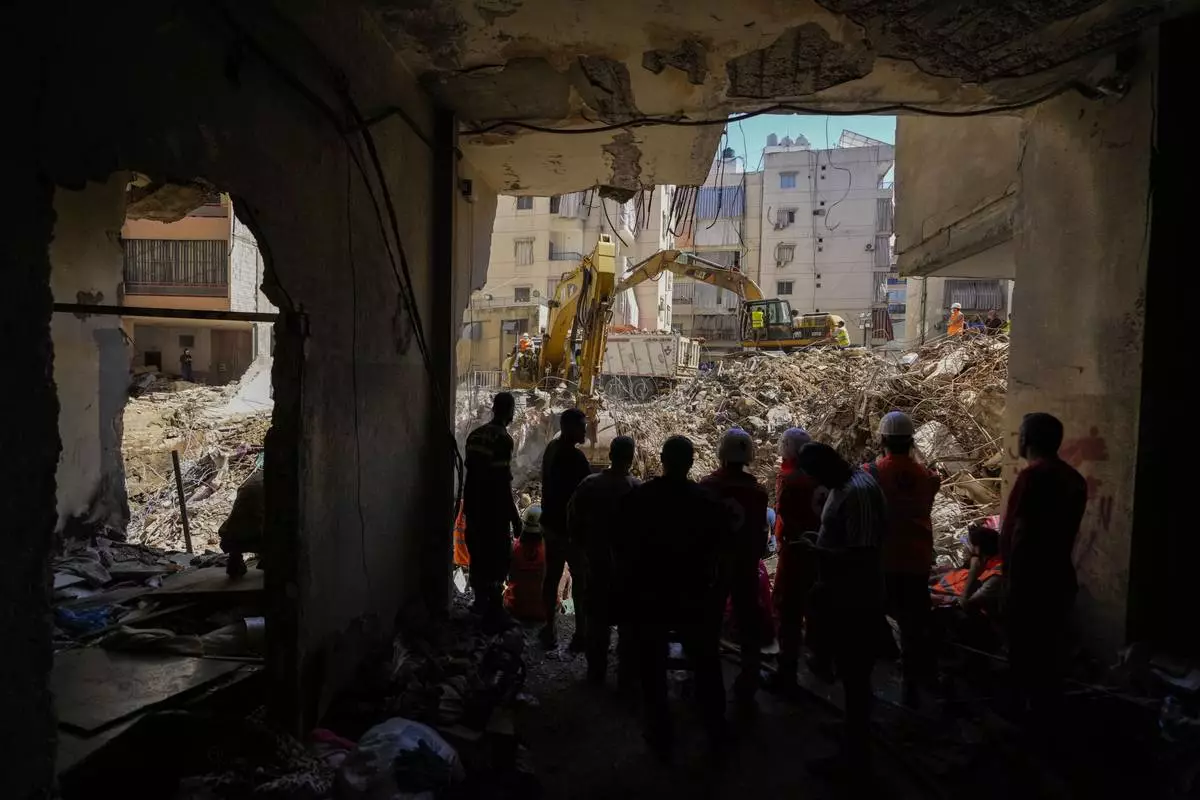
Emergency workers use excavators to clear the rubble at the site of Friday's Israeli strike in Beirut's southern suburbs, Lebanon, Monday, Sept. 23, 2024. (AP Photo/Hassan Ammar)
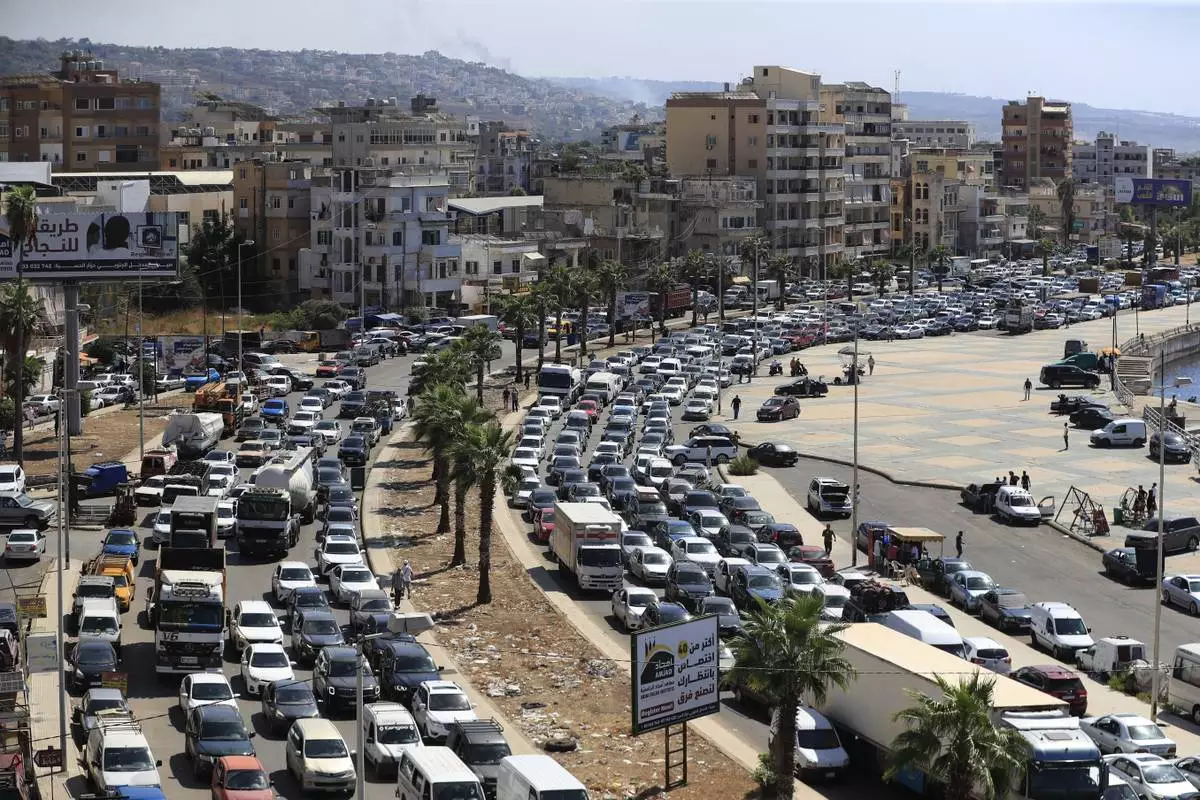
Cars sit in traffic as they flee the southern villages amid ongoing Israeli airstrikes, in Sidon, Lebanon, Monday, Sept. 23, 2024. (AP Photo/Mohammed Zaatari)
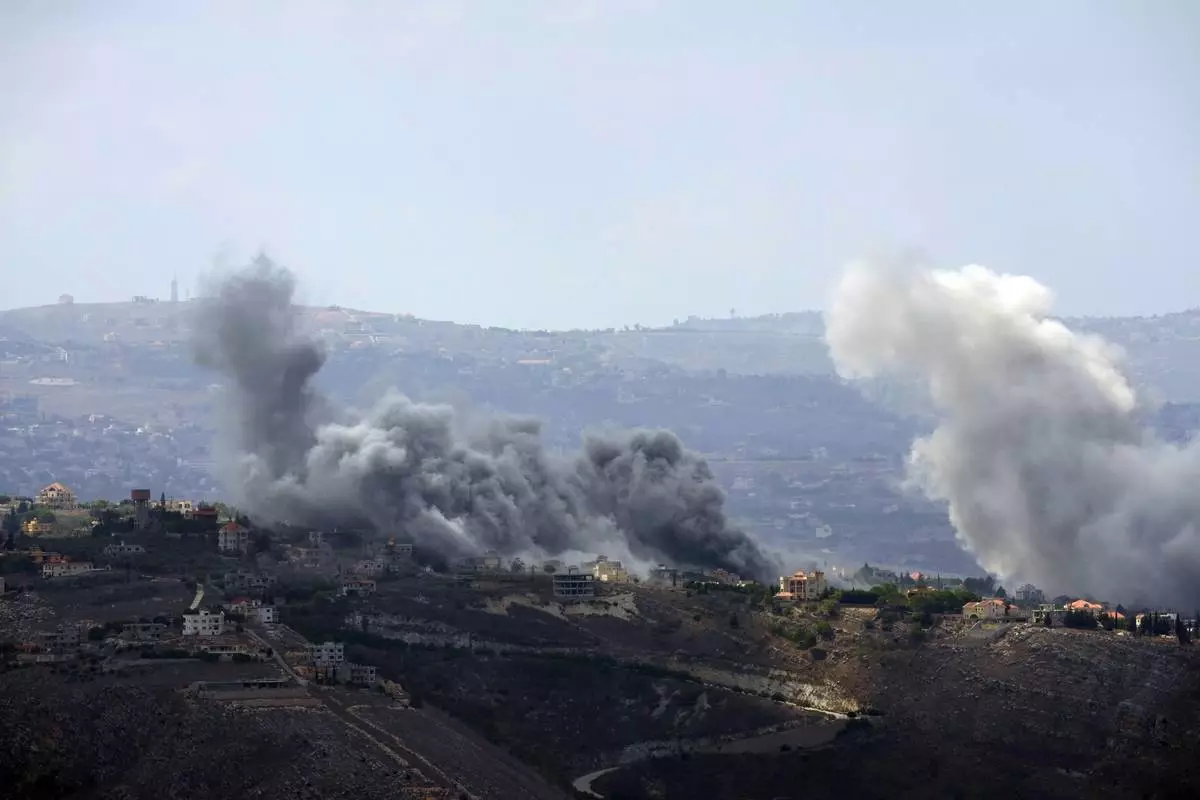
Smoke rises from Israeli airstrikes on Taybeh village, seen from the southern town of Marjayoun, Lebanon, Monday, Sept. 23, 2024. (AP Photo/Hussein Malla)
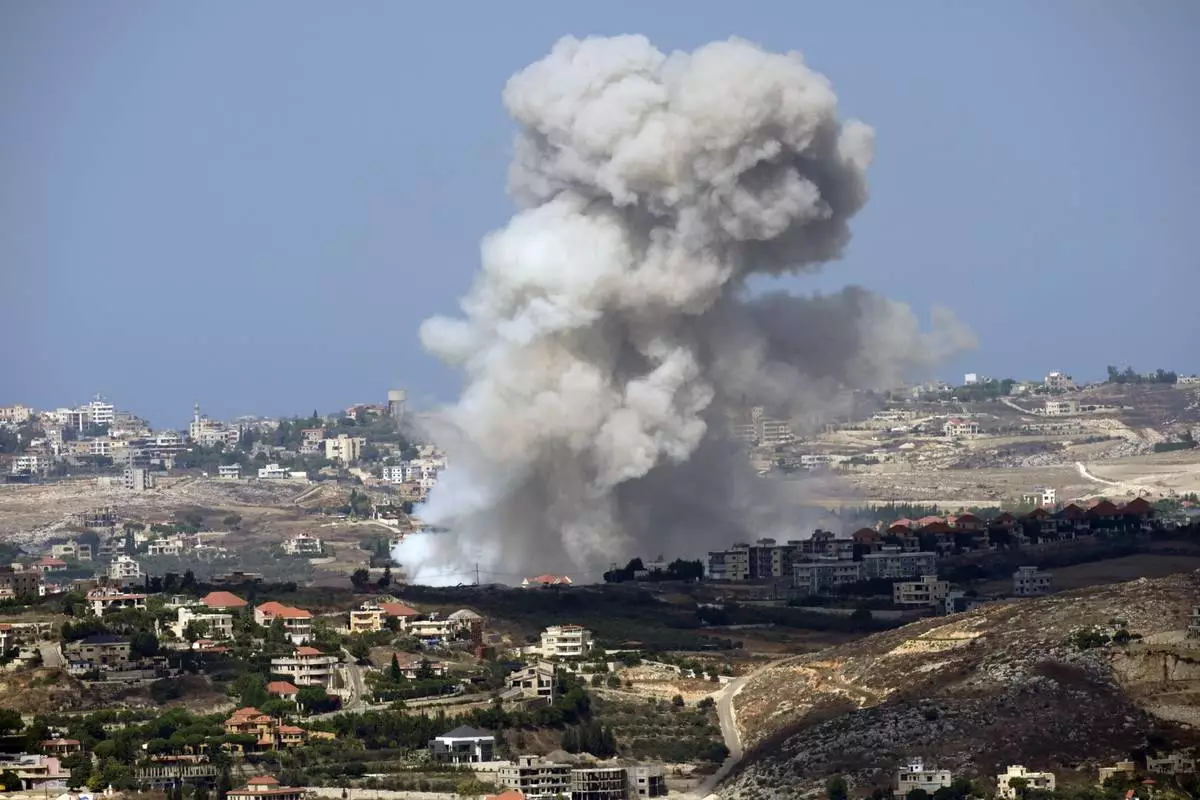
Smoke rises from Israeli shelling on villages in the Nabatiyeh district, seen from the southern town of Marjayoun, Lebanon, Monday, Sept. 23, 2024. (AP Photo/Hussein Malla)
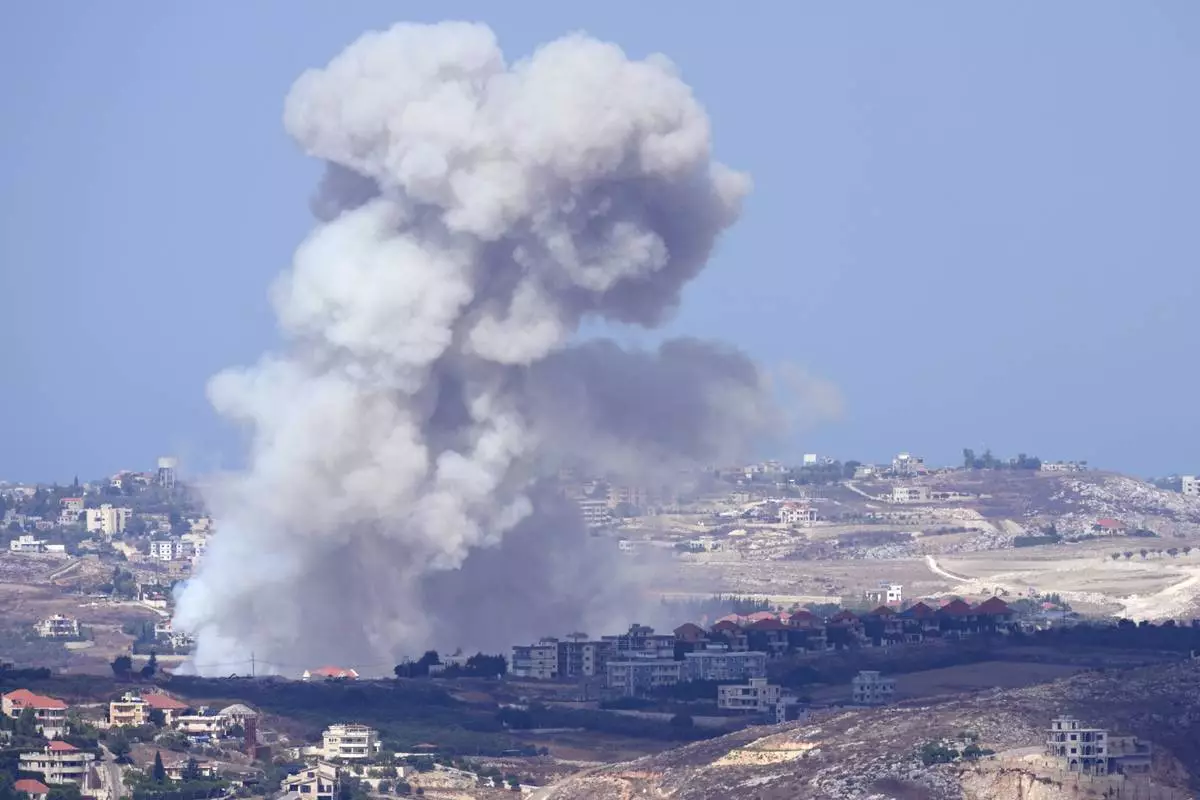
Smoke rises from Israeli airstrikes on villages in the Nabatiyeh district, seen from the southern town of Marjayoun, Lebanon, Monday, Sept. 23, 2024.(AP Photo/Hussein Malla)
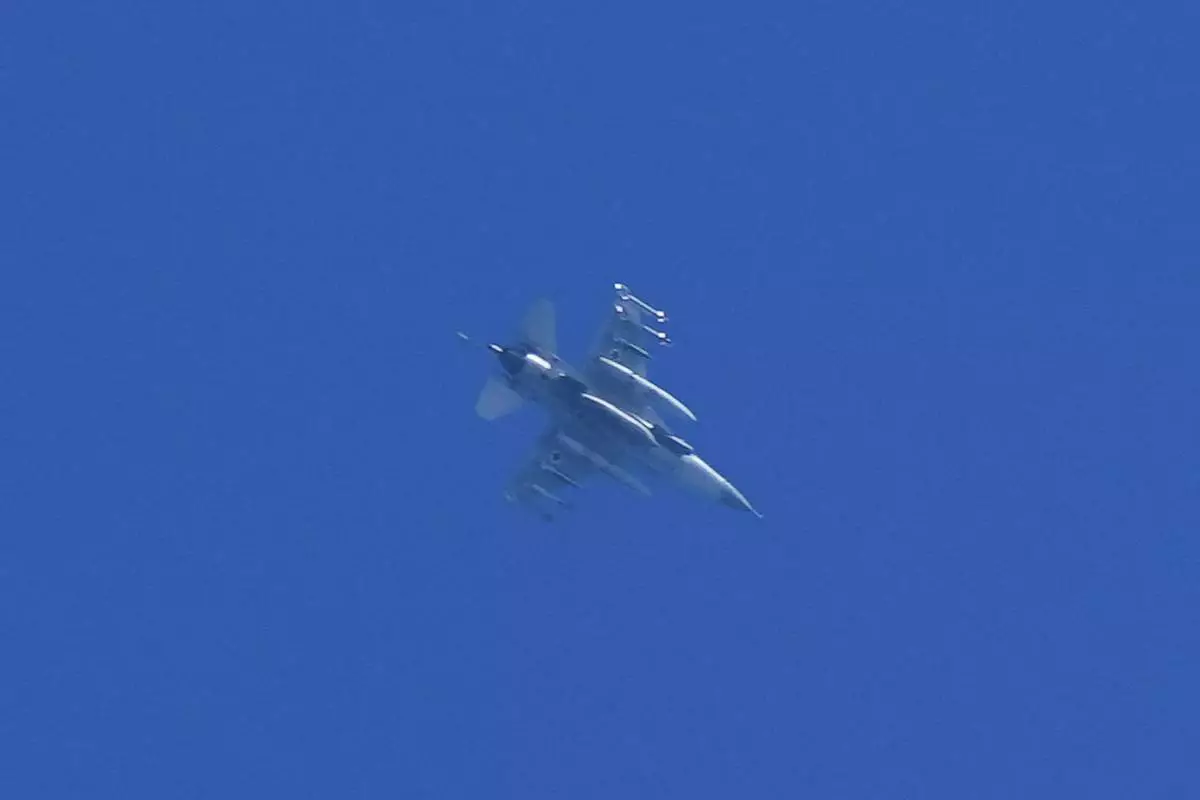
An armed Israeli fighter jet is seen from Haifa, northern Israel, on Monday, Sept. 23, 2024. (AP Photo/Baz Ratner)
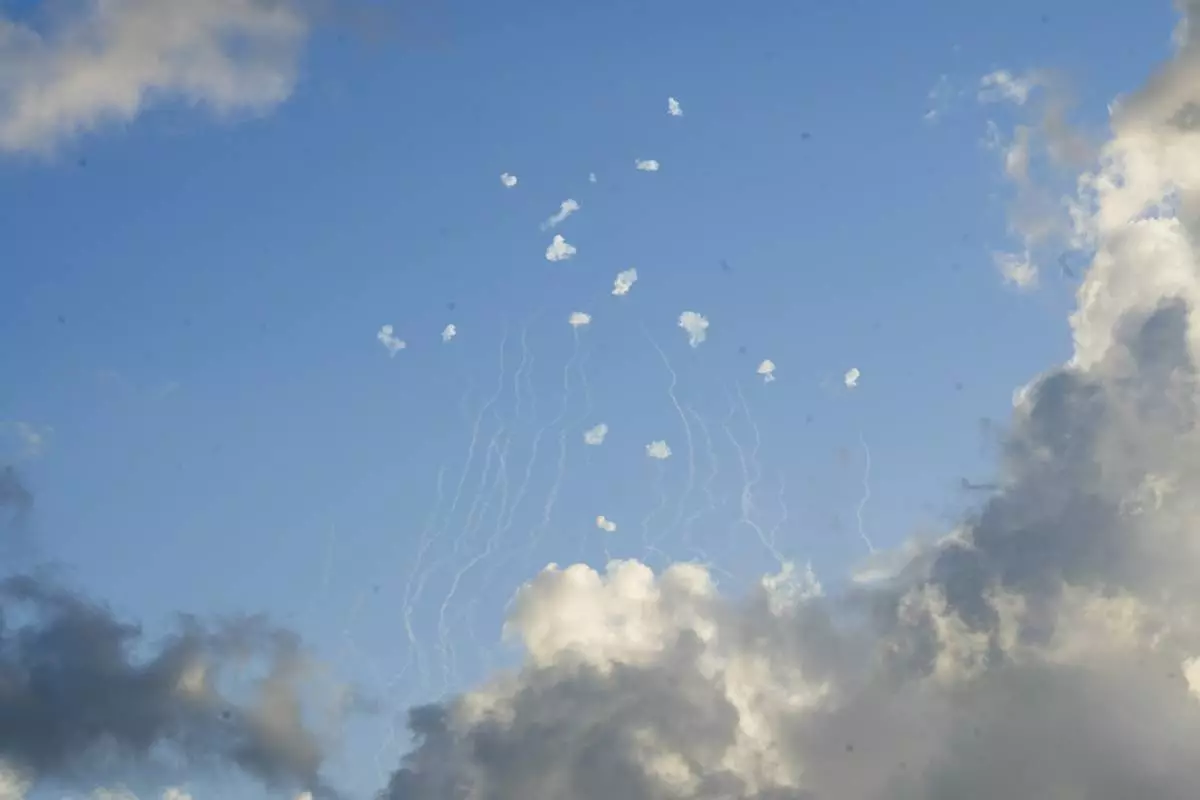
Israeli Iron Dome air defense system fires to intercept rockets that were launched from Lebanon, in northern Israel, Sunday, Sept. 22, 2024. (AP Photo/Baz Ratner)
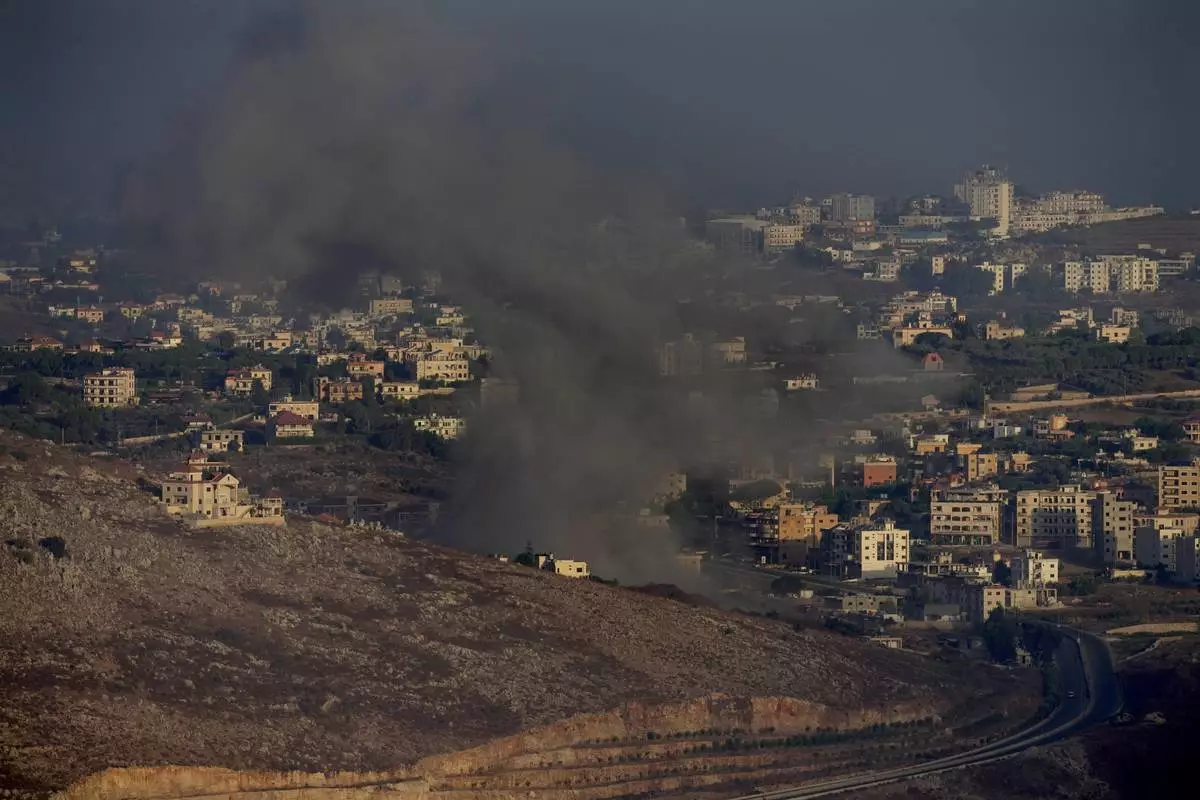
Smoke rises from an Israeli airstrike on Kfar Rouman village, as seen from Marjayoun town, south Lebanon, Monday, Sept. 23, 2024. (AP Photo/Hussein Malla)
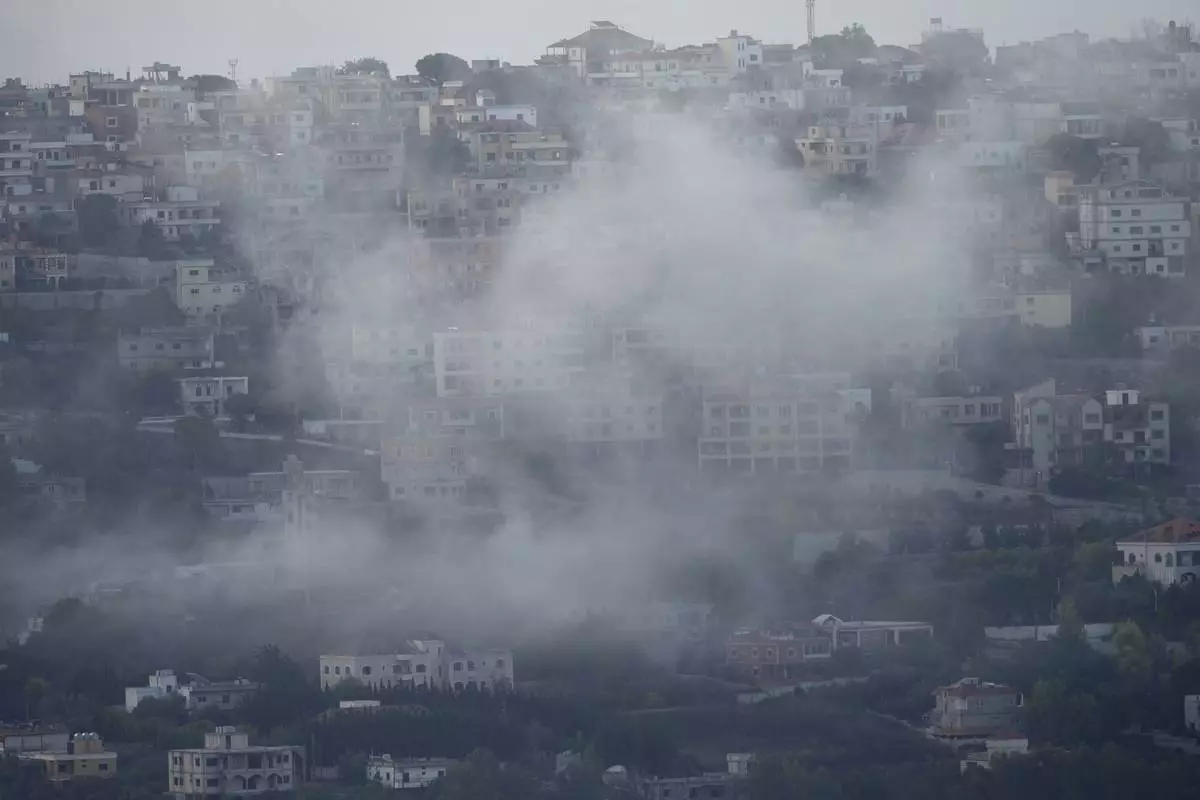
Smoke rises from an Israeli airstrike on Khiam village, as seen from Marjayoun town, south Lebanon, Monday, Sept. 23, 2024. (AP Photo/Hussein Malla)
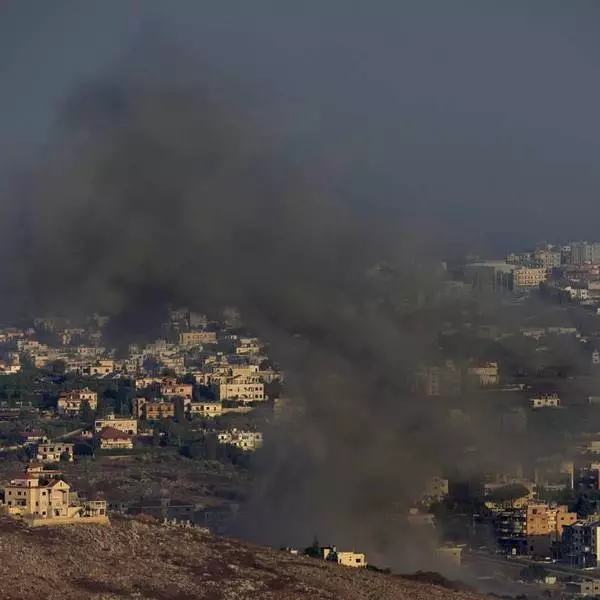
Israel calls on Lebanese to leave homes where Hezbollah stores arms as warplanes launch new strikes
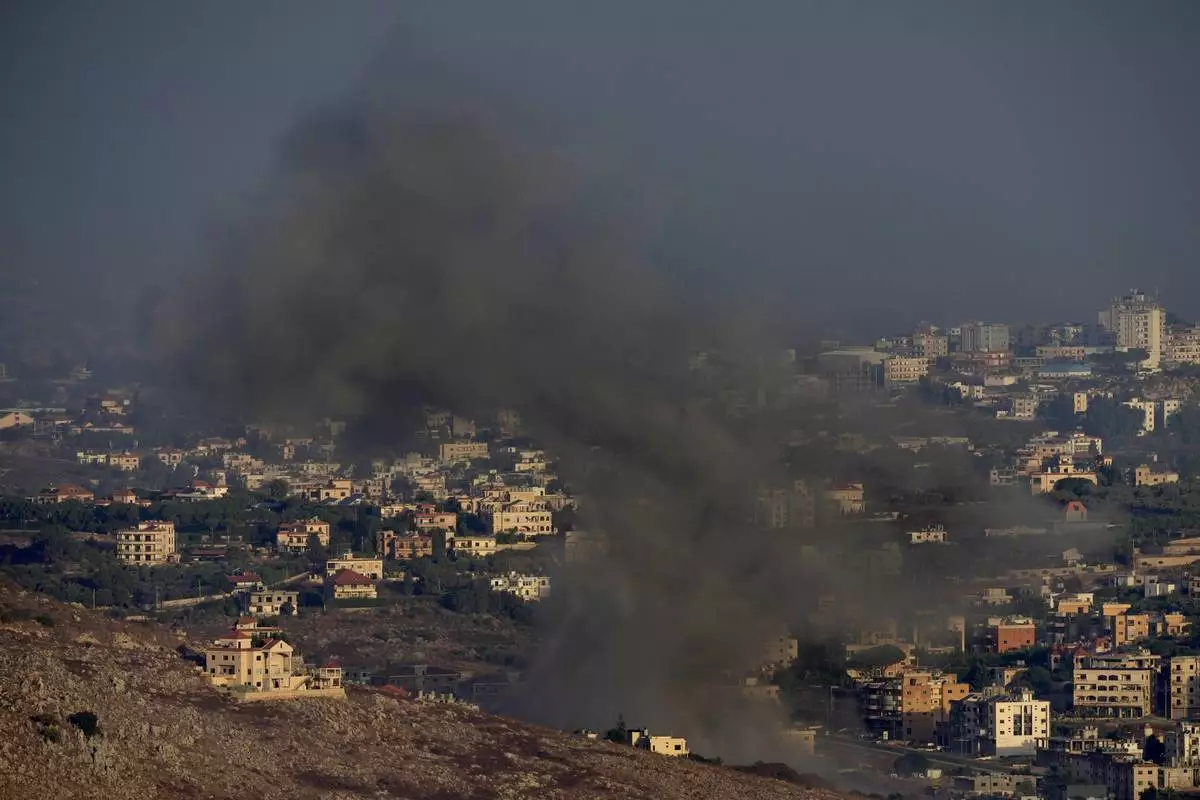
Smoke rises from an Israeli airstrike on Kfar Rouman village, as seen from Marjayoun town, south Lebanon, Monday, Sept. 23, 2024. (AP Photo/Hussein Malla)
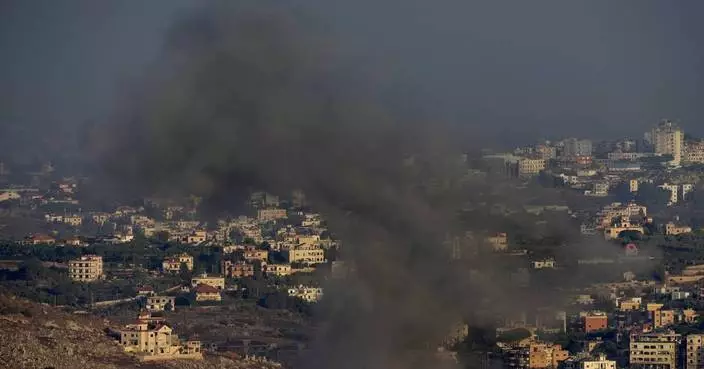
Israel calls on Lebanese to leave homes where Hezbollah stores arms as warplanes launch new strikes




